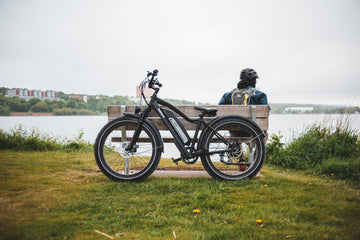Navigate the legal requirements for owning an electric bicycle in Canada with our comprehensive guide. Discover the rules and regulations, including speed limits and helmet requirements, and explore the benefits of the Himiway ebike. Stay informed and ride legally while enjoying the eco-friendly and efficient transportation of electric bicycles.
 Electric bicycles have become increasingly popular in Canada, offering an eco-friendly and efficient mode of transportation. However, riders must understand electric bicycle rules and regulations to ensure legal compliance and a safe riding experience. This article aims to provide a comprehensive guide to navigating the legal requirements for owning an electric bicycle in Canada. As part of this guide, we will introduce the Himiway ebike, a reliable and legal electric bicycle option for Canadian riders.
Electric bicycles have become increasingly popular in Canada, offering an eco-friendly and efficient mode of transportation. However, riders must understand electric bicycle rules and regulations to ensure legal compliance and a safe riding experience. This article aims to provide a comprehensive guide to navigating the legal requirements for owning an electric bicycle in Canada. As part of this guide, we will introduce the Himiway ebike, a reliable and legal electric bicycle option for Canadian riders.
What is a Legal Electric Bicycle in Canada?
In Canada, a legal electric bicycle, is a bicycle that meets specific criteria and is recognized as a separate class of vehicle by the law. Understanding the definition and requirements for a legal electric bike is essential for riders to ensure compliance with the regulations and enjoy the benefits of owning and operating an e-bike.
The Canadian government has established guidelines to distinguish e-bikes from other motorized vehicles, such as mopeds or motorcycles. According to Transport Canada, an electric bicycle is considered legal if it meets the following criteria:
Power Output: The electric motor of an e-bike must have a maximum power output of 500 watts or less. This limitation ensures that e-bikes assist riders without being excessively powerful or classified as motor vehicles.Speed Limit: The electric motor should not propel the e-bike at speeds exceeding 32 kilometers per hour (20 miles per hour) on level ground. This speed limit helps differentiate e-bikes from faster-motorized vehicles, promoting safety on roads and pathways.
Pedal Assistance: E-bikes must have a mechanism that allows riders to pedal to activate the electric motor. This feature distinguishes e-bikes from electric scooters or motorcycles, where propulsion relies solely on the motor.
Weight: There are no specific weight restrictions for e-bikes, but they should maintain a similar weight and structure to traditional bicycles. This criterion ensures that e-bikes can be operated and maneuvered safely.
By meeting these requirements, e-bikes are classified as bicycles rather than motor vehicles, allowing riders to benefit from the same rights and privileges as traditional cyclists. E-bike riders can use bike lanes, pathways, and shared trails, making them a practical and eco-friendly transportation option.
It's important to note that different provinces and territories in Canada may have additional regulations or variations in the definition of legal e-bikes. Therefore, it is advisable to familiarize oneself with the specific rules and regulations in the region where the e-bike will be used.
A legal electric bicycle offers several advantages, including increased mobility, reduced environmental impact, and improved accessibility. E-bikes provide an efficient and sustainable alternative to traditional modes of transportation while promoting physical activity and reducing congestion.
To ensure compliance with the legal requirements, riders should always operate their e-bikes responsibly, follow traffic rules, and prioritize safety by wearing helmets and using appropriate signaling and lighting devices. By adhering to these regulations, riders can enjoy the benefits of e-bikes while contributing to a cleaner and greener transportation landscape in Canada.
To start, defining what constitutes a legal electric bicycle in Canada is important. We will explore the different classifications of electric bikes and the specific legal requirements associated with each class. Understanding these classifications will help riders determine which electric bicycles are permitted on public roads and pathways.
Rules and Regulations Surrounding Electric Bicycles in Canada
In Canada, electric bicycles are subject to specific rules and regulations to ensure the safety of riders and promote responsible use. These regulations may vary slightly across provinces and territories but generally share common guidelines. This section provides an overview of the rules and regulations surrounding electric bicycles in Canada.
One important aspect of these regulations is the classification of electric bicycles. In Canada, electric bicycles are typically classified into three categories: Class 1, Class 2, and Class 3.
Class 1 electric bicycles are pedal-assist bikes that provide assistance only when the rider is pedaling. In contrast, Class 2 electric bicycles have a throttle that can propel the bike without pedaling. Class 3 electric bicycles are also pedal-assist bikes but can reach higher speeds.
Understanding the classification of your electric bicycle is essential, as it determines the speed capabilities and specific requirements for that particular class.
Speed limits for electric bicycles also exist across different provinces and territories. The maximum speed for electric bikes can range from 20 km/h to 32 km/h, depending on the region.
Riders must be aware of and comply with the designated speed limits in their area to ensure their safety and adhere to the law.
Helmet requirements for electric bicycle riders may also vary by province or territory. While it is strongly recommended that all riders wear helmets regardless of local regulations, some jurisdictions may have specific helmet laws. Wearing a helmet is a crucial safety measure that can significantly reduce the risk of head injuries in the event of an accident or fall.
In addition, electric bicycles used on public roads and pathways must meet certain equipment and feature requirements. These may include having proper lighting, such as a front white light and a rear red light or reflector, as well as functioning brakes and audible signaling devices like bells or horns. These features enhance the visibility of the electric bicycle and contribute to the safety of the rider and others sharing the road.
Electric bicycle riders can ensure safety and promote responsible riding practices by adhering to these rules and regulations. Riders must familiarize themselves with the specific laws in their province or territory to ensure compliance and a smooth riding experience. Additionally, staying updated with any changes or updates to these regulations is crucial for maintaining legal compliance while enjoying the benefits of electric bicycles in Canada.

Obtaining a Legal Electric Bicycle in Canada
When obtaining a legal electric bicycle in Canada, important factors must be considered to ensure compliance with regulations and make an informed purchase. In this section, we will provide practical advice on how to go about acquiring an electric bicycle legally in Canada.
Choosing a reputable brand is crucial when purchasing an electric bicycle. Opting for a trusted brand ensures that the bike meets the necessary standards and is designed with quality and reliability in mind. One such brand that stands out is Himiway. Known for its commitment to producing high-quality e-bikes, Himiway offers a range of models that cater to various preferences and riding styles. Their bikes are designed to meet legal requirements and provide Canadian riders with a safe and enjoyable riding experience.
To obtain a legal electric bicycle, purchasing it from authorized dealers or retailers is advisable. These authorized sellers have the knowledge and expertise to guide customers through the buying process and offer genuine, legal electric bicycles. By purchasing from authorized dealers, customers can have peace of mind knowing they are getting a legitimate product that complies with Canadian laws and regulations.
To facilitate the process of acquiring a legal electric bicycle, readers will be directed to authorized dealers where they can purchase an electric bike per Canadian regulations. These dealers will offer a range of models, including Himiway e-bikes, which have been recognized for their durability, power, and range. By highlighting Himiway as a recommended option, readers can consider a trusted brand that aligns with legal requirements and offers a reliable and enjoyable riding experience.
FAQ
1. What are the speed limits for electric bicycles in Canada?
The speed limits for electric bicycles in Canada can vary by province or territory. Generally, electric bicycles are limited to a maximum speed of 32 km/h. However, it is important to check the specific regulations in your province or territory, as some regions may have lower speed limits.
2. Are 750W electric bikes legal in Canada?
No, 750W electric bikes are not generally legal in Canada. The country follows a power limit of 500W for electric bicycles. As long as the electric bike meets this power limit and complies with other regulations, it is considered legal for use on public roads and pathways.
3. Are helmets mandatory for riding electric bicycles in Canada?
Helmet requirements for electric bicycle riders may vary by province or territory. While it is strongly recommended for all riders to wear helmets, some jurisdictions have specific helmet laws. It is advisable to wear a helmet regardless of local regulations to prioritize safety and minimize the risk of head injuries.
4. What is the maximum speed an electric bicycle can reach in Canada?
An electric bicycle's maximum speed in Canada is typically 32 km/h. However, as mentioned earlier, speed limits can vary by province or territory, so it is important to be familiar with the specific regulations in your area.
5. Are electric bicycles subject to the same traffic laws as traditional bicycles?
Electric bicycles are generally subject to the same traffic laws as traditional bicycles in Canada. Riders are expected to follow the same rules and regulations, including stopping at traffic lights, yielding to pedestrians, and using appropriate hand signals. Electric bicycle riders must be aware of and adhere to these traffic laws to ensure their safety and the safety of others on the road.
Conclusion
Understanding the legal requirements for owning an electric bicycle in Canada is essential for riders to ensure compliance and enjoy a safe riding experience. The Himiway ebike stands out as a reliable and legal option, allowing riders to embrace eco-friendly transportation without compromising quality or performance.


















